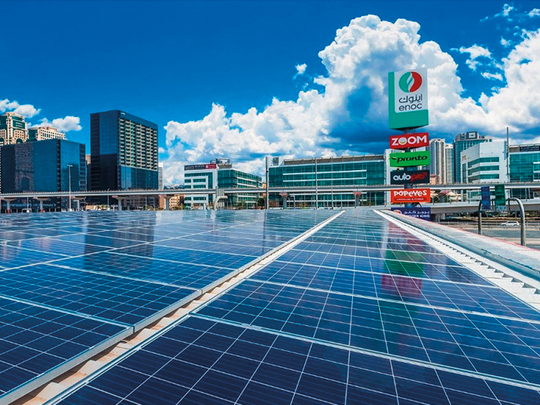
Dubai: The Enoc petrol station at the Dubai Internet City is now harnessing solar energy, making it the first solar-powered service station in the UAE.
The Enoc Group opened the service station located near the entrance of Dubai Internet City on Shaikh Zayed Road on Wednesday.
The service station has installed Photovoltaic (PV) panels on the roof of the canopy that can produce a peak capacity of 120 kWh (Kilowatt per hour) energy on an ideal day, generating approximately 30 per cent more than the average energy required to run the station. The excess power generated is transmitted to Dubai Electricity and Water Authority’s (Dewa) main grid through a solar meter that tracks the power injected to the power grid.
Saeed Mohammad Al Tayer, Vice-Chairman of Enoc Board, Managing Director and CEO of Dewa, inaugurated the station, in the presence of senior officials from Enoc.
Saif Humaid Al Falasi, group CEO of Enoc, said the move reflects Enoc’s commitment to environmental sustainability and energy efficiency in line with the Dubai 2021 Plan to become a smart and sustainable city.
“As the key energy player behind Dubai’s success, we remain committed to expanding the UAE’s infrastructural capabilities as we gear up for Expo 2020. The group has laid out a detailed plan to deliver 14 service stations by 2017. With two service station openings already announced earlier this year, the launch of the UAE’s first solar-powered service station demonstrates our efforts to become an environmentally responsible energy player.”
The DIC service station will reduce the network’s carbon footprint by 195 equivalent tonnes of carbon dioxide (CO2) per year. The station will also deploy several energy-saving technologies such as variable refrigerant flow air-conditioning units, motion-sensor energy lighting and vapour recovery (VR) system which uses a process to recover vapour released from the petrol dispensers and storage tanks and condense it back into fuel form. The VR system is expected to convert up to 20,000 litres of fuel.
The DIC service station is a pilot site for a number of energy-saving technologies such as Vapour Recovery systems and PV panels. All future Enoc service stations will have provisions to install PV panels on the roof of the canopy.












